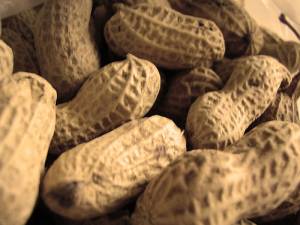
The UK Telegraph reported yesterday that doctors at Addenbrooke’s hospital in Cambridge may have found a “cure” for peanut allergies.
Four boys were given minute amounts of peanut flour mixed with yogurt every day. The amount ingested was then slowly increased over a period of six months.
Prior to the trials, when exposed to just a fraction of the peanut protein found in a single peanut, these boys displayed significant allergic reactions, requiring immediate treatment. At trial’s end, however, all the children were able to eat between 10 and 12 peanuts.
To maintain their tolerance, the children will have to continue ingesting a small daily amount of peanut protein, either as peanut flour, smooth peanut butter, or five roasted peanuts.
It is imperative to note that these trials were conducted under close medical supervision, and that parents should not attempt to undertake their own or their children’s desensitization to peanut allergies. Don’t try this at home, folks.
It is also important to note that this is not so much a cure, as an increase in tolerance. It is unclear whether the children will have to continue their daily maintenance doses indefinitely to maintain their tolerance levels, or for how long the effect will last. However, this study does indicate that is is possible to reduce sensitivity to peanut proteins through oral peanut immunotherapy, even in children whose allergies were severe. And that is cause for hope.
Being able to tolerate up to 10 peanuts without adverse reactions would mean a huge breath of relief for peanut allergy sufferers and their parents. It would be difficult for a child to accidentally ingest that much peanut protein. While parents would still have to be vigilant, there wouldn’t be the same intense, constant fear of exposure. Kids could broadly expand the variety in their diet, feel more free to try new foods, and not have to wonder if a school snack might put them into anaphylactic shock. That’s a heavy burden for a child to bear.
A wider study is underway to see if these results can be replicated.
Photo Credit: tamburix under Creative Commons
That’s fascinating if it pans out and stands up to further testing. It lends further credence to the theory that it’s a LACK of exposure to certain allergens that increases the likelihood of severe allergies rather than an over-exposure or too early exposure… And if it works for peanuts perhaps it will work for other allergies as well… This could — IF it pans out — really shed a ton of light on the biology of allergies.
Very, very interesting. I was actually just reading about how gradually increasing exposure to dairy products can start to increase the tolerance for those with milk-protein allergies. Of course, most babies outgrow that one. I don’t think a lot of kids tend to outgrow a peanut allergy, but I suppose it is still the same basic idea.
There has been so much talk on whether or not moms should eat peanuts while pregnant and breastfeeding. I wonder how that plays into this as well?